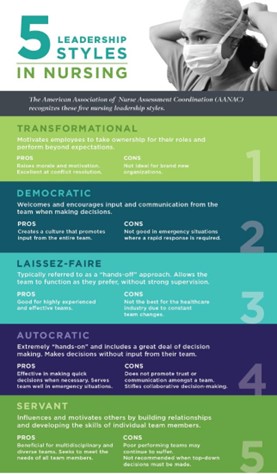A nurse is planning an in-service that encourages active member participation and feedback about decreasing nosocomial infections on the unit. Which of the following leadership styles does the nurse plan to use?
Democratic
Laissez-faire
Autocratic
Open-door
The Correct Answer is A
The nurse is planning to use a democratic leadership style when conducting an in-service that encourages active member participation and feedback about decreasing nosocomial infections on the unit. A democratic leader values the input and opinions of team members and encourages participation and collaboration in decision-making. By encouraging active participation and feedback from team members, the nurse is demonstrating a democratic approach to leadership.
The other options are not the leadership style that the nurse plans to use in this situation. A laissez-faire leader [b] takes a hands-on approach and allows team members to make their own decisions without providing guidance or direction. An autocratic leader [c] makes decisions unilaterally without seeking input or feedback from team members. An open-door leader [d] maintains an open-door policy and is accessible to team members, but this does not necessarily involve active participation and feedback from team members.

Nursing Test Bank
Naxlex Comprehensive Predictor Exams
Related Questions
Correct Answer is A
Explanation
The nurse should give the statement "I will notify the charge nurse of your request to have only male staff members assigned to care for you." This response shows that the nurse is respecting the client's wishes and taking appropriate action to address their concerns.
Option B is incorrect because it is not within the nurse's scope of practice to arrange for a specific AP to provide care.
Option C is incorrect because it does not address the client's concerns or wishes.
Option D is incorrect because it may be perceived as confrontational and does not address the client's concerns in a respectful and professional manner.
Correct Answer is D
Explanation
Focusing on the day-to-day operations of the unit is a function of management. Management involves planning, organizing, directing, and controlling the resources of an organization to achieve its goals. In the context of a healthcare unit, this includes managing staff, resources, and processes to ensure that the unit runs smoothly and provides high-quality care to patients.
Option A is incorrect because leadership refers to the ability to inspire and motivate others to achieve a common goal.
Option B is incorrect because visionary refers to the ability to see and plan for the future.
Option C is incorrect because bioethics is the study of ethical issues in medicine and healthcare.
Whether you are a student looking to ace your exams or a practicing nurse seeking to enhance your expertise , our nursing education contents will empower you with the confidence and competence to make a difference in the lives of patients and become a respected leader in the healthcare field.
Visit Naxlex, invest in your future and unlock endless possibilities with our unparalleled nursing education contents today
Report Wrong Answer on the Current Question
Do you disagree with the answer? If yes, what is your expected answer? Explain.
Kindly be descriptive with the issue you are facing.
